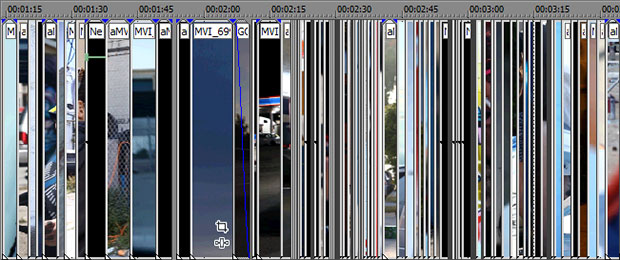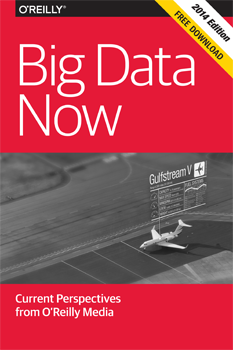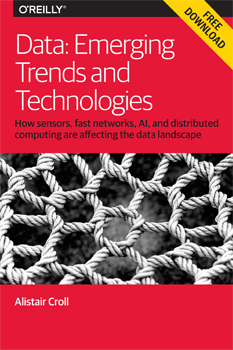"Big Data Perils" entries

Year Zero: Our life timelines begin
In the next decade, Year Zero will be how big data reaches everyone and will fundamentally change how we live.
Editor’s note: this post originally appeared on the author’s blog, Solve for Interesting. This lightly edited version is reprinted here with permission.
In 10 years, every human connected to the Internet will have a timeline. It will contain everything we’ve done since we started recording, and it will be the primary tool with which we administer our lives. This will fundamentally change how we live, love, work, and play. And we’ll look back at the time before our feed started — before Year Zero — as a huge, unknowable black hole.
This timeline — beginning for newborns at Year Zero — will be so intrinsic to life that it will quickly be taken for granted. Those without a timeline will be at a huge disadvantage. Those with a good one will have the tricks of a modern mentalist: perfect recall, suggestions for how to curry favor, ease maintaining friendships and influencing strangers, unthinkably higher Dunbar numbers — now, every interaction has a history.
This isn’t just about lifelogging health data, like your Fitbit or Jawbone. It isn’t about financial data, like Mint. It isn’t just your social graph or photo feed. It isn’t about commuting data like Waze or Maps. It’s about all of these, together, along with the tools and user interfaces and agents to make sense of it.
Every decade or so, something from military or enterprise technology finds its way, bent and twisted, into the mass market. The client-server computer gave us the PC; wide-area networks gave us the consumer web; pagers and cell phones gave us mobile devices. In the next decade, Year Zero will be how big data reaches everyone. Read more…

Now available: Big Data Now, 2014 edition
Our wrap-up of important developments in the big data field.
- Cognitive augmentation: As data processing and data analytics become more accessible, jobs that can be automated will go away. But to be clear, there are still many tasks where the combination of humans and machines produce superior results.
- Intelligence matters: Artificial intelligence is now playing a bigger and bigger role in everyone’s lives, from sorting our email to rerouting our morning commutes, from detecting fraud in financial markets to predicting dangerous chemical spills. The computing power and algorithmic building blocks to put AI to work have never been more accessible.

A brief look at data science’s past and future
In this O'Reilly Data Show Podcast: DJ Patil weighs in on a wide range of topics in data science and big data.
Back in 2008, when we were working on what became one of the first papers on big data technologies, one of our first visits was to LinkedIn’s new “data” team. Many of the members of that team went on to build interesting tools and products, and team manager DJ Patil emerged as one of the best-known data scientists. I recently sat down with Patil to talk about his new ebook (written with Hilary Mason) and other topics in data science and big data.
Subscribe to the O’Reilly Data Show Podcast
Here are a few of the topics we touched on:
Proliferation of programs for training and certifying data scientists
Patil and I are both ex-academics who learned learned “data science” in industry. In fact, up until a few years ago one acquired data science skills via “on-the-job training.” But a new job title that catches on usually leads to an explosion of programs (I was around when master’s programs in financial engineering took off). Are these programs the right way to acquire the necessary skills? Read more…

The promise and problems of big data
A look at the social and moral implications of living in a deeply connected, analyzed, and informed world.
Editor’s note: this is an excerpt from our new report Data: Emerging Trends and Technologies, by Alistair Croll. You can download the free report here.
We’ll now look at both the light and the shadows of this new dawn, the social and moral implications of living in a deeply connected, analyzed, and informed world. This is both the promise and the peril of big data in an age of widespread sensors, fast networks, and distributed computing.
Solving the big problems
The planet’s systems are under strain from a burgeoning population. Scientists warn of rising tides, droughts, ocean acidity, and accelerating extinction. Medication-resistant diseases, outbreaks fueled by globalization, and myriad other semi-apocalyptic Horsemen ride across the horizon.Can data fix these problems? Can we extend agriculture with data? Find new cures? Track the spread of disease? Understand weather and marine patterns? General Electric’s Bill Ruh says that while the company will continue to innovate in materials sciences, the place where it will see real gains is in analytics.
It’s often been said that there’s nothing new about big data. The “iron triangle” of Volume, Velocity, and Variety that Doug Laney coined in 2001 has been a constraint on all data since the first database. Basically, you could have any two you want fairly affordably. Consider:
- A coin-sorting machine sorts a large volume of coins rapidly, but assumes a small variety of coins. It wouldn’t work well if there were hundreds of coin types.
- A public library, organized by the Dewey Decimal System, has a wide variety of books and topics, and a large volume of those books — but stacking and retrieving the books happens at a slow velocity.
What’s new about big data is that the cost of getting all three Vs has become so cheap it’s almost not worth billing for. A Google search happens with great alacrity, combs the sum of online knowledge, and retrieves a huge variety of content types. Read more…

Privacy is a concept, not a regime
In this O'Reilly Radar Podcast: Dr. Gilad Rosner talks about data privacy, and Alasdair Allan chats about the broken IoT.
In this podcast episode, I catch up with Dr. Gilad Rosner, a visiting researcher at the Horizon Digital Economy Research Institute in England. Rosner focuses on privacy, digital identity, and public policy, and is launching an Internet of Things Privacy Forum. We talk about personal data privacy in the age of the Internet of Things (IoT), privacy as a social characteristic, an emerging design ethos for technologists, and whether or not we actually own our personal data. Rosner characterizes personal data privacy as a social construct and addresses the notion that privacy is dead:
“Firstly, it’s important to recognize the idea that privacy is not a regime to control information. Privacy is a much larger concept than that. Regimes to control information are ways that we as a society preserve privacy, but privacy itself emerges from social needs and from individual human needs. The idea that privacy is dead comes from the vulnerability that people are feeling because they can see that it’s very difficult to maintain walls between their informational spheres, but that doesn’t mean that there aren’t countercurrents to that, and it doesn’t mean that there aren’t ways, as we go forward, to improve privacy preservation in the electronic spaces that we continue to move into.”
As we move more and more into these electronic spaces and the Internet of Things becomes democratized, our notions of privacy are shifting on a cultural level beyond anything we’ve experienced as a society before. Read more…

The big data sweet spot: policy that balances benefits and risks
Deciding what data to collect is hard when consequences are unpredictable.
A big reason why discussions of “big data” get complicated — and policy-makers resort to vague hand-waving, as in the well-known White House executive office report — is that its ripple effects travel fast and far. Your purchase, when recorded by a data broker, affects not only the the ads and deals they offer you in the future, but the ones they offer innumerable people around the country that share some demographic with you.
Policy-making might be simple if data collectors or governments could say, “We’ll collect certain kinds of data for certain purposes and no others” — but the impacts of data collection are rarely predictable. And if one did restrict big data that way, its value would be seriously reduced.
Follow my steps: big data privacy vs collection
Data collection will explode as we learn how to connect you to different places you’ve been by the way you walk or to recognize certain kinds of diseases by your breath.
When such data exhaust is being collected, you can’t evade consequences by paying cash and otherwise living off the grid. In fact, trying to do so may disadvantage you even more: people who lack access to sophisticated technologies leave fewer tracks and therefore may not be served by corporations or governments. Read more…

Big data’s big ideas
From cognitive augmentation to artificial intelligence, here's a look at the major forces shaping the data world.

Looking back at the evolution of our Strata events, and the data space in general, we marvel at the impressive data applications and tools now being employed by companies in many industries. Data is having an impact on business models and profitability. It’s hard to find a non-trivial application that doesn’t use data in a significant manner. Companies who use data and analytics to drive decision-making continue to outperform their peers.
Up until recently, access to big data tools and techniques required significant expertise. But tools have improved and communities have formed to share best practices. We’re particularly excited about solutions that target new data sets and data types. In an era when the requisite data skill sets cut across traditional disciplines, companies have also started to emphasize the importance of processes, culture, and people. Read more…



